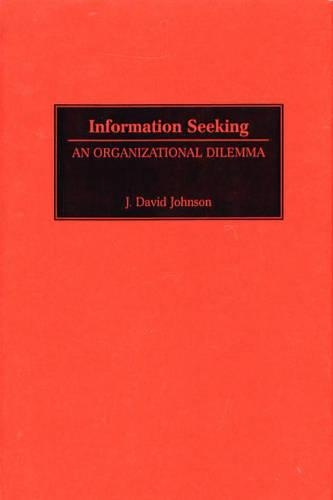
Information Seeking: An Organizational Dilemma
(Hardback)
Publishing Details
Information Seeking: An Organizational Dilemma
By (Author) J. David Johnson
Bloomsbury Publishing PLC
Praeger Publishers Inc
30th June 1996
United States
Classifications
Tertiary Education
Non Fiction
Library and information sciences / Museology
Organizational theory and behaviour
020
Physical Properties
Hardback
200
Description
How do people in organizations get the information they need to do their work, and what are the effects of their research positive and negativeon their organizations Indeed, says the author of this unique, provocative study, the forces that promote ignorance within organizations often outweigh the drive to obtain knowledge. Johnson explores both sides of the information-seeking dilemma, the reasons why people do and do not look for and get the information they needand why the multi-billion-dollar technologies that have been developed to facilitate information gathering so often fail. Research-based, with a model to explain how information seeking works in organizations, Dr. Johnson's book will be fascinating, essential reading not only for gatherers of information in all types of organizations, but for the purveyors, their technological support staffs. The study of information seeking is one of great pragmatic importance for individuals, organizations, and our society. It is also one that is more complex than it might at first appear, presenting many dilemmas for the organization. Chapter 1 provides a basic overview of the importance of information seeking and a definition. Chapter 2 describes the more general communication structure of organizations in which individual information seeking is embedded. While traditional views of structure were based on the need to restrict information access in order to reduce information load, more modern views try to capture how organizations can process ever larger volumes of information. Chapter 3 describes the information fields outside of the organization. Chapter 4 develops a more complete picture of the information carriers that individuals have to select from. Chapter 5 describes the barriers to information seeking which often result from the real benefits of ignorance for both individuals and organizations. Chapter 6 details strategies individuals can use in their search for information. Chapter 7 discusses what management can do to facilitate a seeker's search for information. In summary, Chapter 8 weaves all of the themes of the book together in discussing the importance of the development of a theory of information seeking and the pragmatic implications of information seeking for our society as a whole.
Reviews
"Johnson's premise is that communication technology made the modern organization possible, while developments in both communication and information technology make entirely new organizational forms, such as networked organizations, possible.... This book will be especially pertinent to those interested in organizational communication and behavior.... [R]ecommended for upper-division undergradute and graduate business collections."-Choice
Johnson's premise is that communication technology made the modern organization possible, while developments in both communication and information technology make entirely new organizational forms, such as networked organizations, possible.... This book will be especially pertinent to those interested in organizational communication and behavior.... [R]ecommended for upper-division undergradute and graduate business collections.-Choice
Author Bio
J. DAVID JOHNSON is Professor and Chairperson of the Department of Communication, Michigan State University. He is author of numerous articles and reviews in refereed journals on his research interests, which focus on organizational communication structure, information seeking, and health communication. Dr. Johnson is and has been a consulting editor for major journals in his fields and is author of a previous book, Organizational Communication Structure (1993).
